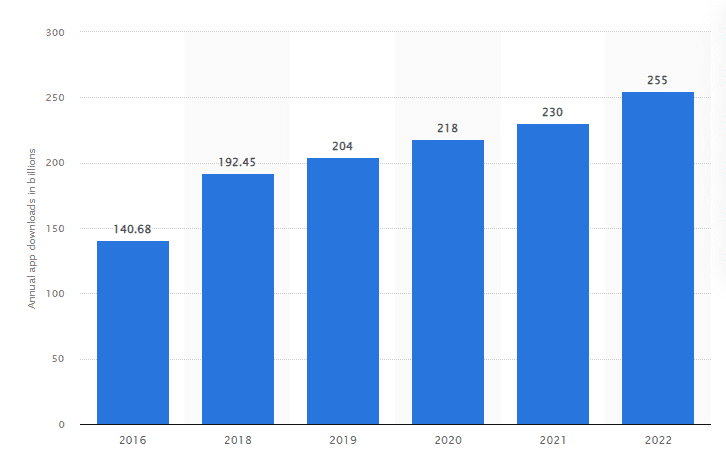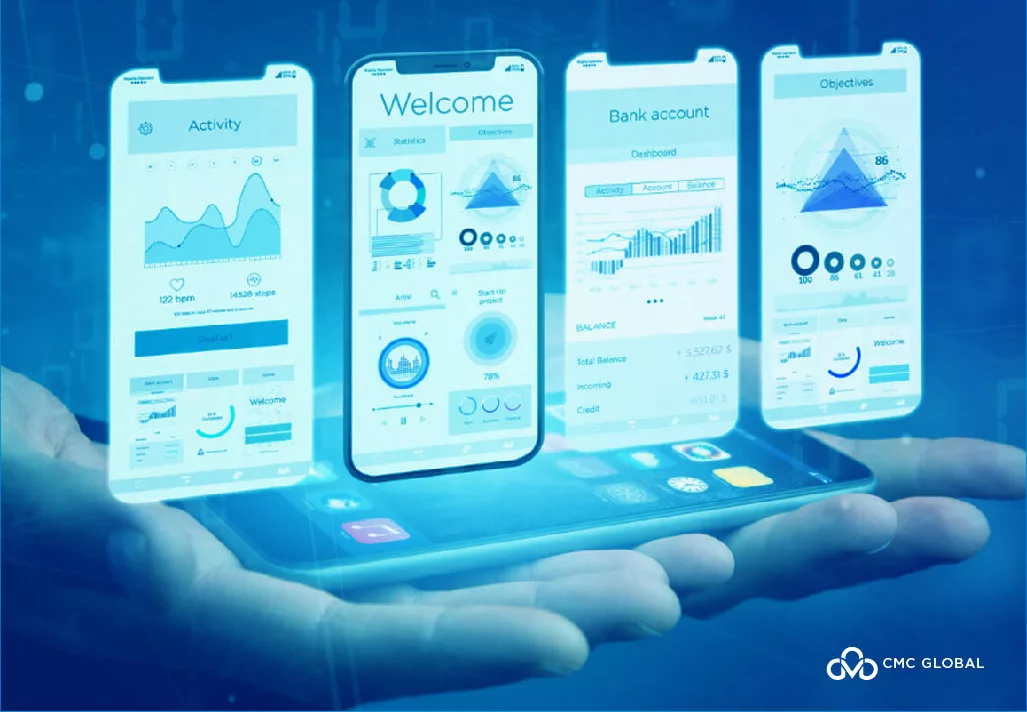Let’s go over all the information that business owners need to know about the app boom and hybrid vs. native apps before developing apps for their organizations.
A brief overview of the mobile apps market
Since 2016, the amount of mobile app downloads has steadily climbed, topping 200 billion in 2019. In 2022, users downloaded 255 billion mobile apps to their devices, a more than 50% increase from 140.7 billion app downloads in 2016.

Number of mobile app downloads worldwide from 2016 to 2022 (in billions)
Source: Statista
With so many apps published each year, it is critical to understand how to differentiate hybrid and native apps.
What are hybrid and native apps?
Web apps are responsive sites that do not require downloading on a device. Instead, you can access them via browsers on either desktop or mobile phones.
Native apps are mobile applications to function on one operating system only. As a result, there are native apps for Android, iOS, and Windows. Native Android apps cannot run on iOS or Windows devices, and vice versa.
The combination of native apps with web apps is known as a hybrid app. Hybrid apps are meant to replicate the content of an existing website in an application setting. Hybrid apps can be viewed via a web browser as well as downloaded from an app store.
Pros of hybrid apps
- Cross-platform development: One codebase can be used to create apps for multiple platforms, reducing development time and effort.
- Web technology stack: Developers can leverage their existing web development skills to build hybrid apps.
- Faster development cycle: Changes can be made in real time without the need for app store approval, making the development cycle quicker.
Cons of hybrid apps
- Performance: Hybrid apps may not perform as well as native apps in terms of speed and responsiveness, as they rely on web technologies and an additional layer of native container.
- Limited access to device features: Hybrid apps may have limited access to certain device features compared to native apps, as they need to rely on plugins or other workarounds to access native functionality.
- User experience: Hybrid apps may not always provide the same level of native-like user experience and performance, which may impact user satisfaction.
Pros of native apps
- Performance: Native apps are optimized for a specific platform, which can result in superior performance compared to hybrid apps.
- Access to device features: Native apps can access all the device features and APIs directly, providing full functionality and integration with the device’s capabilities.
- Native user experience: Native apps can provide a seamless and native-like user experience in terms of performance, look and feel, and interaction patterns, which can result in better user satisfaction.
Cons of native apps
- Platform-specific development: Native apps require separate development efforts for each platform, which can be time-consuming and costly.
- Learning curve: Developing native apps requires knowledge of platform-specific programming languages and frameworks, which may require additional time and effort to learn.
- App store approval: Native apps need to go through app store approval processes, which can add additional time to the development cycle.
Differences between hybrid and native apps
| Criteria | Hybrid apps | Native apps |
| Code language | HTML, CSS, and JavaScript languages | The language is determined by the platform (Java or Objective-C for Android, Swift for iOS, etc) |
| Time |
|
|
| Cost |
|
|
| Performance |
|
|
| Internal working | Client and browser code are contained in a container or native shell.
|
Client code is created in the technology and language of the device or platform on which it will be placed |
| Updated version | Users will always be on the most recent version. | Users need to download the updated version |
When to use hybrid vs native apps
To reach the biggest potential client base, large enterprises need to use a combination of native, hybrid, and web apps. Consider the following aspects before deciding on the right app type for your business.
Time to market
Early-stage start-ups tend to use web apps to create a minimum viable product for clients quickly. Native and hybrid apps demand significantly more time, preparation, and work to launch successfully.
Customer specifications
Some products and services have an important user base that uses mobile apps to carry out tasks on a regular basis. Native applications are recommended over hybrid and web apps in this instance.
Marketing strategy
For certain businesses, the project for developing an app is frequently strongly related to their marketing objectives. They employ a progressive web app to reach the broadest potential audience and obtain sign-ups
Complexity
In some cases, the mobile app functionality is so sophisticated that there is no choice but to create hybrid or native apps to meet the needs. Mobile banking apps, for example, require native features to keep fingerprint authorization functionalities.
Final thoughts
Hybrid vs. native apps: whichever option you decide on, always choose the option that will best benefit the end user. You should constantly keep the demands and preferences of the end-users in mind. Balance that with the app’s final purpose, and you’ll be well on your way to developing a successful piece of technology for your company.
If you’re considering developing an app for your business, we’re here to help! Contact us for a free consultation, where we will address your initial concerns and assist you in understanding the process.




